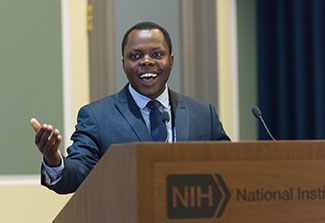First fellow graduates from NIH-Rwanda program
July / August 2017 | Volume 16, Issue 4
A Rwandan physician who had a yearlong fellowship at the NIH is returning home with a new purpose - to help prevent diabetes - and the research skills to make it happen.

Photo by Andrew Propp/NIH
Dr. Jean Utumatwishima delivers a presentation as the
inaugural graduate of the NIH's new training partnership
program with Rwanda.
Dr. Jean Nepo Utumatwishima is the inaugural graduate of a training program supported by Rwanda's Ministry of Health and NIH's National Institute on Minority Health and Health Disparities (NIMHD) and the National Institute of Diabetes and Digestive and Kidney Diseases (NIDDK).
NIDDK's Dr. Anne E. Sumner, who created the program, says she was inspired to help build research expertise in Rwanda after attending the
2015 Barmes Global Health Lecture, delivered by then Minister of Health Dr. Agnes Binagwaho, who described the country's recovery from the 1994 genocide. The event was attended by Dr. Margaret Udahogora from the University of Maryland, who introduced Sumner to Binagwaho. Fogarty's director Dr. Roger I. Glass then facilitated communication among the parties and planning for the fellowship began.
Rwanda's Ministry of Health selects candidates to be considered for the program - which currently has one slot per year - pays for the travel to and from the U.S., and guarantees a university position upon return to Rwanda. NIMHD provides the fellowship salary. NIDDK offers mentoring led by Sumner, who heads its Section on Ethnicity and Health in the Diabetes, Obesity and Endocrinology Branch, which is focused on diabetes and heart disease prevention in people of African descent worldwide. It is possible the program could grow into a demonstration project showing the value of collaboration between NIH and other low- and middle-income countries.
During his year at NIH, Utumatwishima, a surgeon and director of a 300-bed government hospital, attended weekly rounds at the NIH Clinical Center and took courses in clinical research, biostatistics, writing and publishing scientific articles, and grant writing. In addition, he mastered software, including REDCap (Research Electronic Data Capture), a free, secure method for data collection, which is available globally.
Utumatwishima intends to apply what he learned at NIH to prevent diabetes and manage diabetes in Rwanda, starting by collecting much-needed data on disease prevalence.
Sumner hopes that the graduates of the training program can lead initiatives in Rwanda that will result in a nationwide diabetes registry so that diabetes diagnosis and prevention efforts there can become a model for other African countries.
The program's long-term goal is to develop the intellectual power and infrastructure needed in Rwanda to form a viable entity to improve public health, establish a diabetes registry and successfully compete for international funding.
Utumatwishima returned home to Rwanda in July enthusiastic to begin work. "I think this year will be a turning point in my career," he says. "This experience is eye-opening for a scientist. I am committed to making sure it has an impact on people far from the U.S., as this is the true definition of global health."
More Information
To view Adobe PDF files,
download current, free accessible plug-ins from Adobe's website.